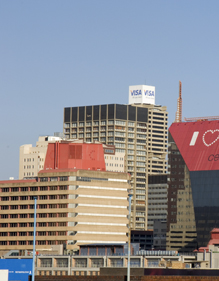|
Getting your Trinity Audio player ready...
|
 By Chantelle Benjamin
By Chantelle Benjamin
13 April 2012 – South African law places onerous obligations on local companies to ensure that they do not participate in corruption, bribery or fraud, whether within the country or abroad, yet few companies are fully aware of compliance requirements to the relevant legislation.
This is according to Steven Powell, an executive with leading law firm Edward Nathan Sonnenbergs, who says from his experience, most businesses in South Africa have given almost no attention to implementing anti-bribery measures.
The Prevention and Combating of Corrupt Activities Act of 2004 (PCCAA) makes it possible for South African companies to be prosecuted in other countries, in terms of the anti-corruption or bribery legislation of those countries.
Recent allegations around major JSE-listed cellphone company MTN’s dealings in Iran, which emerged in a US-based court case brought by a Turkish company Turkcell, raised questions about the responsibility of local directors or senior managers at South African companies when an offence takes place in another country.
Corruption Watch spoke to legal practitioners from two leading firms who, by their own admission, found only a passing mention was made the PCCAA, with emphasis being placed more on fiduciary duties of directors when it came to the performance of a company – or officials acting for a company – and whether they could be said to have been acting in the interest of their shareholders.
A lack of active pursuit and prosecution of companies in South Africa because of capacity constraints could be a factor.
According to the Act, it is an offence not to report corrupt activities involving R10 000 or more by any person who holds a position of authority and who knows or suspects that any other person had committed an offence of corruption, theft, fraud, extortion, forgery or uttering a forged document.
The Act also has extra-territorial jurisdiction if the accused person is a South African citizen, resident or company, or is a body or person, corporate or incorporated in South Africa, or was arrested in the country at the time the offence was committed.
Powell said it is only multi-nationals who are actively taking measures to satisfy the law.
“The Act has never really been widely pursued in South Africa, which could explain a lack of diligence when it comes to anti-bribery legislation,” said Powell.
Although the National Prosecuting Authority is presently investigating four cases related to violation of this law, Powell said there are insufficient resources allocated to pursue complicated cases of this nature, despite the success rate of commercial crimes courts with cases that do make it to court.
He said plea bargaining, which sees a 15-year sentence negotiated to a shorter one in return for cooperation, sees on average five-year sentences being awarded where the money involved goes into several million rands.
“If the crime is in the R1-million category, often correctional supervision is imposed,” he said.
However, he added, the lack of capacity in South Africa should not allow local companies to become complacent.
According to Powell, the US has found its Foreign Corrupt Practices Act (FCPA) particularly lucrative – collecting fines of up to US$1.8-billion and seeing 53 prosecutions in 2010 – and the PCCAA leaves the way open for prosecution in other countries.
“The Act is multijurisdictional, which means it would apply to agents or intermediaries in other countries, and there would be no double jeopardy, as each jurisdiction can extract its own penalties,” said Powell.
“In the United States, they will pursue a company if there is an email thread going through the country. It does not require that money pass through US banks.”
Powell said action by the US against defence company BAE Systems, Siemens and telecommunications company, Alcatel Lucent, as well as those involving Hewlett Packard, involved cooperation between the US and European countries.
The UK also has a far-reaching Act – the UK Bribery Act – which came into effect in July last year.
Of this, Powell said: “There is still little precedence set in the UK, with only one conviction, but it does place onerous provisions on South African companies which fail to prevent bribery on their behalf through their business dealings and links with the UK.”
South Africa is also a signatory to the UN Convention against Corruption, which requires each country to make it a criminal offence to bribe foreign public officials or any offences that obstruct justice, allow for money laundering or for participation or the instigation of corruption.
Other anti-corruption legislation that exists in South Africa has been effective, but does not have extra jurisdictional application. These are the Prevention of Organised Crime Act (POCA), the Protected Disclosure Act (known as the Whistleblower Act) and the Financial Intelligence Centre Act (Fica) (the anti-money laundering initiative).
Fica requires brokers, estate agents and lawyers to report suspicious transactions to the Financial Intelligence Centre, which is then required to report the transactions to the appropriate body for investigation.
A review of the Special Commercial Crime Unit’s performance from 2004 to 2009, showed an impressive conviction rate of 93.7%. One of the largest cases for the period – S v Ghavalas, involving fraud initially believed to be to the amount of R400-million, reveals how plea bargain deals can be both effective and problematic when trying to convict co-accused.
In this case, the accused Peter Ghavalas was given a 15-year suspended sentence and required to pay back at least R18-million to pensioners who had been defrauded in a scheme that saw companies allegedly claim pension surpluses. He agreed to testify for the State in trials involving other co-accused in the same matter.
By December 2011, a number of accused had admitted guilt and repaid R900-million, but by then Ghavalas had moved to Australia and efforts to get him to testify or sign affidavits in some outstanding cases was proving problematic.








